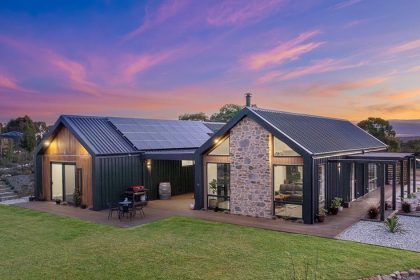As Australia’s building industry lifts the lid on its sustainability problem, the ingenuity behind some quirky outback dunnies could see portaloos flushed away from some of Australia’s biggest construction sites.
With more than 100,000 portable toilets in use in Australia, job sites have long grappled with the high financial and ecological costs of the giant blue plastic potties.
Traditional portaloos require water, harsh chemicals and truck-driven waste transportation regularly, which can raise construction sites’ carbon footprint and cause environmental damage.
But the creation of an eco-friendly compostable toilet block on a goat station deep in the New South Wales outback could provide an insight into the future of Australia’s most popular outdoor dunnies.
The eco-toilet block 35km north of Broken Hill was built for the annual Mundi Mundi Bash music festival and includes nearly 300 specially designed composting toilets.
The restroom replacements require no power or water access and have cost organisers a fraction of what they would traditionally spend on chemical-based portaloos.
Its cost-conscious construction has already saved Mundi Mundi close to $200,000 as it pulls the chain on no longer-needed services such as pump trucks, road train vehicles, tank equipment and staffing.
The swap will also save 140,000 litres of water per festival, remove emissions from waste transportation and reduce the use of environment-impacting chemicals.
Compostable loo benefits
- No water is needed for flushing.
- Drastically reduced emissions in the transport of sewage.
- No bleaches, formaldehyde or other chemicals used in cleaning.
- Dry compost is created for use in the nearby community.
A volunteer team of organisers known as “dunny angels” assist with cleaning and the removal and replacement of waste drums.

Mundi Mundi director Lucas Trihey told Build-it compostable toilet blocks could provide Australia’s long-term job sites, such as mines, with a chance to cut down their carbon footprint.
“Compost loos can be used anywhere,” he said.
“Not every organisation will want to take them on – but for those who do, there are big cost savings to be made, and most importantly, they make a positive contribution to the environment.”
“The carbon footprint of a compost loo compared to a chemical porta loo is very small.”
How do they work?
- For your number ones, nothing changes.
- For your number twos, simply cover it up with one scoop of sawdust.
- Use the hand sanitiser pump pack to clean your hands.
The remote projects mountaineer, who has set up base camps in Antarctica and Mt Everest, said feedback for the toilets had been universally positive, with construction workers likely left singing on the toilet, too.
“We get rave reviews on social media after each event. The only smell is usually a faint smell of the timber from the sawdust,” he told Build-it.
“The natural, aerobic bacterial processes that take place means that they don’t smell.”
The waste materials will be stored in composting drums for a year, eventually used and sold as high-quality compost.
The Mundi Mundi Bash’s sister festival, the Big Red Bash at Birdsville, uses the same eco-friendly toilet system on a smaller scale, with its compostable creations used in the local council area, at the festival site and some sold to private businesses.







